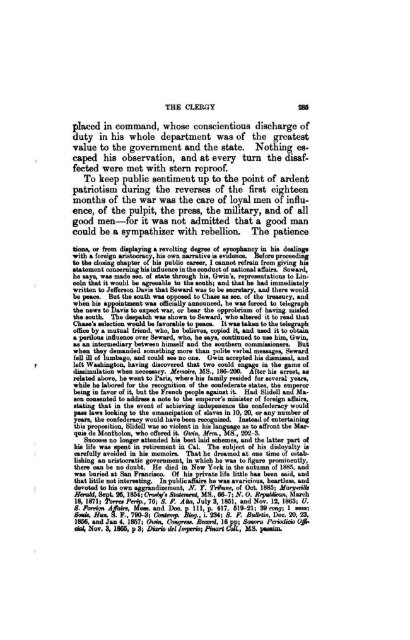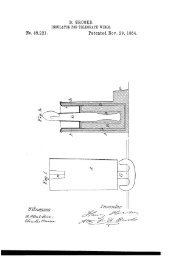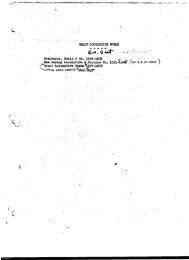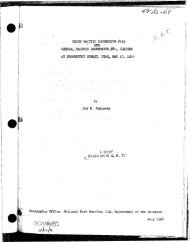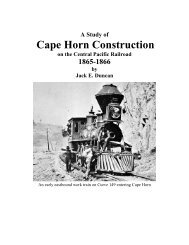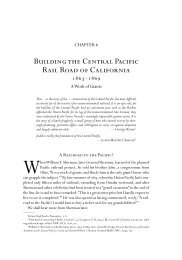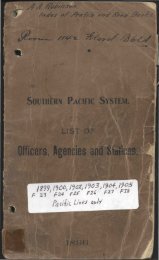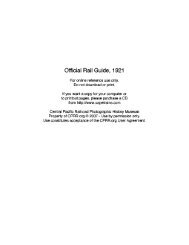- Page 1 and 2:
THE WORKS , HUBERT HOWE BANCROFT VO
- Page 3 and 4:
SIMFORD 'WWEKSHY* liBRARY
- Page 5 and 6:
450334 Entered according to Act of
- Page 7 and 8:
vi CONTENTS. CHAPTER IV. LIVESTOCK.
- Page 9 and 10:
tffi CONTENTS. PAQB Determined, and
- Page 11 and 12:
x CONTENTS. CHAPTER XVII. MILITARY,
- Page 13 and 14:
jrii CONTENTS. CHAPTER XXV. RECENT
- Page 15 and 16:
2 THE DEVELOPMENT OF AGRICULTURE. s
- Page 17 and 18:
4 THE DEVELOPMENT OF AGRICULTURE. T
- Page 19 and 20:
6 THE DEVELOPMENT OF AGRICULTURE. e
- Page 21 and 22:
8 THE DEVELOPMENT OF AGRICULTURE. T
- Page 23 and 24:
10 THE DEVELOPMENT OF AGRICULTURE.
- Page 25 and 26:
12 THE DEVELOPMENT OF AGRICULTURE.
- Page 27 and 28:
14 THE DEVELOPMENT OF AGRICULTURE.
- Page 29 and 30:
16 THE DEVELOPMENT OF AGRICULTURE.
- Page 31 and 32:
18 THE DEVELOPMENT OF AGRICULTURE.
- Page 33 and 34:
20 THE DEVELOPMENT OF AGRICULTURE.
- Page 35 and 36:
22 THE DEVELOPMENT OP AGRICULTURE.
- Page 37 and 38:
CHAPTER II. CEREALS AND OT^ER PRODU
- Page 39 and 40:
26 CEREALS AND OTHER PRODUCTS. For
- Page 41 and 42:
28 CEREALS AND OTHER PRODUCTS. rais
- Page 43 and 44:
90 CEREALS AND OTHER PRODUCTS. The
- Page 45 and 46:
82 CEREALS AND OTHER PRODUCTS. its
- Page 47 and 48:
U CEREAU3 ASD OTHER PRODUCTS. The s
- Page 49 and 50:
88 CEREALS AND OTHER PRODUCTS. free
- Page 51 and 52:
CHAPTER III. FRUIT-GROWING AND GRAP
- Page 53 and 54:
40 FRUIT-GROWING AND GRAPES. The pr
- Page 55 and 56:
42 FRUIT-GROWING AND GRAPES The ora
- Page 57 and 58:
44 FRUIT-GROWING AND GRAPES. decade
- Page 59 and 60:
46 FRUIT-GROWING AND GRAPES. nized
- Page 61 and 62:
48 FRUIT-GROWING AND GRAPES. Califo
- Page 63 and 64:
00 FRUIT-GROWING AND GRAPES. and ma
- Page 65 and 66:
CHAPTER IV. LIVE-STOCK. 1769-1889.
- Page 67 and 68:
M LIVE-STOCK. only 631,000 cattle,
- Page 69 and 70:
66 LIVE-STOCK. much neglected by th
- Page 71 and 72:
58 LIVE-STOCK. of the total 237,700
- Page 73 and 74:
00 LIVE-STOCK. Goats receive little
- Page 75 and 76:
62 LIVE-STOCK. Poultry have been pr
- Page 77 and 78:
64 LIVE-STOCK. assumed the lead in
- Page 79 and 80:
W LIVE-STOCK. local clubs to form a
- Page 81 and 82:
CHAPTER V. MANUFACTURES. 1848-1889.
- Page 83 and 84:
70 MANUFACTURES. aqueducts, and win
- Page 85 and 86:
72 MANUFACTURES. causes, 1 such as
- Page 87 and 88:
74 MANUFACTURES. raw material, and
- Page 89 and 90:
76 MANUFACTURES. humid coast and mo
- Page 91 and 92:
78 MANUFACTURES. favored by the sma
- Page 93 and 94:
80 MANUFACTURES. 1750,000 worth. Wi
- Page 95 and 96:
12 MANUFACTURES. Brazoria. The gold
- Page 97 and 98:
84 MANUFACTURES. The high quality o
- Page 99 and 100:
86 MANUFACTURES. viniculture to see
- Page 101 and 102:
66 MANUFACTURES. cigar factories in
- Page 103 and 104:
90 MANUFACTURES. ties. 8. F. Bull,
- Page 105 and 106:
92 MANUFACTURES. above the shipment
- Page 107 and 108:
94 MANUFACTURES. Nov. 11, 1871; Jan
- Page 109 and 110:
W MANUFACTURES. mass of castings; 1
- Page 111 and 112:
98 MANUFACTURES. 1847, when 40,000
- Page 113 and 114:
100 MANUFACTURES. employed nearly $
- Page 115 and 116:
CHAPTER VI. FOREIGN COMMERCE. 1848-
- Page 117 and 118:
104 FOREIGN COMMERCE. so that flour
- Page 119 and 120:
106 FOREIGN COMMERCE. the harbor we
- Page 121 and 122:
108 FOREIGN COMMERCE. loss, in some
- Page 123 and 124:
110 FOREIGN COMMERCE. large crops,
- Page 125 and 126:
112 FOREIGN COMMERCE. explanation f
- Page 127 and 128:
114 FOREIGN COMMERCE. In the follow
- Page 129 and 130:
116 FOREIGN COMMERCE. The gold disc
- Page 131 and 132:
118 FOREIGN COMMERCE. Metals formed
- Page 133 and 134:
120 FOREIGN COMMERCE. The direction
- Page 135 and 136:
122 FOREIGN COMMERCE. tension of mi
- Page 137 and 138:
124 FOREIGN COMMERCE. Most of those
- Page 139 and 140:
126 FOREIGN COMMERCE. their mooring
- Page 141 and 142:
128 FOREIGN COMMERCE. ers, which ha
- Page 143 and 144:
CHAPTER VII. INLAND AND OVERLAND TR
- Page 145 and 146:
132 INLAND AND OVERLAND TRAFFIC. al
- Page 147 and 148:
134 INLAND AND OVERLAND TRAFFIC. 18
- Page 149 and 150:
136 INLAND AND OVERLAND TRAFFIC. Na
- Page 151 and 152:
138 INLAND AND OVERLAND TRAFFIC. Am
- Page 153 and 154:
140 INLAND AND OVERLAND TRAFFIC. de
- Page 155 and 156:
142 INLAND AND OVERLAND TRAFFIC. pr
- Page 157 and 158:
144 INLAND AND OVERLAND TRAFFIC. Wa
- Page 159 and 160:
146 INLAND AND OVERLAND TRAFFIC. A
- Page 161 and 162:
148 INLAND AND OVERLAND TRAFFIC. pe
- Page 163 and 164:
150 INLAND AND OVERLAND TRAFFIC. es
- Page 165 and 166:
152 INLAND AND OVERLAND TRAFFIC. pe
- Page 167 and 168:
154 INLAND AND OVERLAND TRAFFIC. cl
- Page 169 and 170:
156 INLAND AND OVERLAND TRAFFIC. su
- Page 171 and 172:
158 BUSINESS METHODS AND CHARACTERI
- Page 173 and 174:
160 BUSINESS METHODS AND CHARACTERI
- Page 175 and 176:
162 BUSINESS METHODS AND CHARACTERI
- Page 177 and 178:
164 BUSINESS METHODS AND CHARACTERI
- Page 179 and 180:
166 BUSINESS METHODS AND CHARACTERI
- Page 181 and 182:
168 BUSINESS METHODS AND CHARACTERI
- Page 183 and 184:
170 BUSINESS METHODS AND CHARACTERI
- Page 185 and 186:
172 BUSINESS METHODS AND CHARACTERI
- Page 187 and 188:
174 BUSINESS METHODS AND CHARACTERI
- Page 189 and 190:
176 BUSINESS METHODS AND CHARACTERI
- Page 191 and 192:
178 BUSINESS METHODS AND CHARACTERI
- Page 193 and 194:
180 BUSINESS METHODS AND CHARACTERI
- Page 195 and 196:
182 BUSINESS METHODS AND CHARACTERI
- Page 197 and 198:
184 BUSINESS METHODS AND CHARACTERI
- Page 199 and 200:
186 BUSINESS METHODS AND CHARACTERI
- Page 201 and 202:
188 BUSINESS METHODS AND CHARACTERI
- Page 203 and 204:
190 AUTHORITIES. SanLuisOb. Co. His
- Page 205 and 206:
192 CRIMINAL AND JUDICIAL. jurisdic
- Page 207 and 208:
194 CRIMINAL AND JUDICIAL. cent. In
- Page 209 and 210:
196 CRIMINAL AND JUDICIAL provision
- Page 211 and 212:
198 CRIMINAL AND JUDICIAL. Upon suc
- Page 213 and 214:
200 CRIMINAL AND JUDICIAL. identity
- Page 215 and 216:
202 CRIMINAL AND JUDICIAL. ing, as
- Page 217 and 218:
204 CRIMINAL AND JUDICIAL. years, a
- Page 219 and 220:
206 CRIMINAL AND JUDICIAL. desperat
- Page 221 and 222:
208 CRIMINAL AXD JUDICIAL. made con
- Page 223 and 224:
210 CRIMINAL AND JUDICIAL, post the
- Page 225 and 226:
212 CRIMINAL AND JUDICIAL. dismissa
- Page 227 and 228:
214 CRIMINAL AND JUDICIAL. was indi
- Page 229 and 230:
216 CRIMINAL AND JUDICIAL. ment. Of
- Page 231 and 232:
218 CRIMINAL AND JUDICIAL. 1871 to
- Page 233 and 234:
CHAPTER X. THE JUDICIARY. 1850-1872
- Page 235 and 236:
222 THE JUDICIARY. before his time
- Page 237 and 238:
224 THE JUDICIARY. they could not a
- Page 239 and 240:
226 THE JUDICIARY. of their displea
- Page 241 and 242:
228 THE JUDICIARY. mineral or agric
- Page 243 and 244:
230 THE JUDICIARY. on or before Jan
- Page 245 and 246: 232 THE JUDICIARY. supreme court, i
- Page 247 and 248: 234 THE JUDICIARY. by a special ele
- Page 249 and 250: 236 THE JUDICIARY. by Royal T. Spra
- Page 251 and 252: 238 THE JUDICIARY. The United State
- Page 253 and 254: 240 THE JUDICIARY. in regard to jur
- Page 255 and 256: 242 THE JUDICIARY. own expense to h
- Page 257 and 258: 244 THE JUDICIARY. turbed, and some
- Page 259 and 260: 246 THE JUDICIARY. creating a feeli
- Page 261 and 262: 248 THE JUDICIARY. ject to alterati
- Page 263 and 264: 260 THE JUDICIARY. 1872, parts of t
- Page 265 and 266: 252 LOYALTY, OR DISUNION AND A PACI
- Page 267 and 268: 254 LOYALTY, OR DISUNION AND A PACI
- Page 269 and 270: 266 LOYALTY, OR DISUNION AND A PACI
- Page 271 and 272: 258 LOYALTY, OR DISUNION AND A PACI
- Page 273 and 274: 260 LOYALTY, OR DISUNION AND A PACI
- Page 275 and 276: 262 LOYALTY, OR DISUNION AND A PACI
- Page 277 and 278: 264 LOYALTY, OR DISUNION AND A PACI
- Page 279 and 280: 266 LOYALTY, OR DISUNION AND A PACI
- Page 281 and 282: 268 LOYALTY, OR DISUNION AND A PACI
- Page 283 and 284: 272 LOYALTY, OR DISUNION AND A PACI
- Page 285 and 286: 274 LOYALTY, OR DISUNION AND A PACI
- Page 287 and 288: 276 PERIOD OF CIVIL WAR. elected to
- Page 289 and 290: 278 PERIOD OF CIVIL WAR. bands disc
- Page 291 and 292: 280 PERIOD OF CIVIL WAR. militia la
- Page 293 and 294: 282 PERIOD OF CIVIL WAR. it in Wash
- Page 295: 281 PERIOD OF CIVIL WAR. both sides
- Page 299 and 300: 288 PERIOD OF CIVIL WAR. sent an ar
- Page 301 and 302: f 290 PERIOD OF CIVIL WAR. of 1861-
- Page 303 and 304: 292 PERIOD OF CIVIL WAR chusetts, h
- Page 305 and 306: 294 PERIOD OF CIVIL WAR. taken adva
- Page 307 and 308: 296 PERIOD OF CIVIL WAR party lines
- Page 309 and 310: 298 PERIOD OF CIVIL WAR. a felony,
- Page 311 and 312: 300 PERIOD OF CIVIL WAR. another au
- Page 313 and 314: 802 PERIOD OF CIVIL WAR. administra
- Page 315 and 316: 3
- Page 317 and 318: 306 PERIOD OF CIVIL WAR. ber, and i
- Page 319 and 320: 808 PERIOD OF CIVIL WAR. cisco; M.
- Page 321 and 322: 310 PERIOD OF CIVIL WAR. 4 system w
- Page 323 and 324: 812 PERIOD OF CIVIL WAR. forsaking
- Page 325 and 326: 314 PERIOD OF CIVIL WAR. certain lo
- Page 327 and 328: 316 PARTY CHANGES in their respecti
- Page 329 and 330: 318 PARTY CHANGES. resisting the ch
- Page 331 and 332: 320 PARTY CHANGES. service, among w
- Page 333 and 334: 122 PARTY CHANGES. opment, which wa
- Page 335 and 336: 324 PARTY CHANGES. to state offices
- Page 337 and 338: 326 PARTY CHANGES. now being used t
- Page 339 and 340: 828 PARTY CHANGES. Casserly, 16 an
- Page 341 and 342: 330 • PARTY CHANGES. district, an
- Page 343 and 344: 832 PARTY CHANGES. was over 18,000.
- Page 345 and 346: 334 PARTY CHANGES. of increased wag
- Page 347 and 348:
336 CHINESE, THE LABOR AGITATIOX, A
- Page 349 and 350:
338 CHINESE, THE LABOR AGITATION, A
- Page 351 and 352:
840 CHINESE, THE LABOR AGITATION, A
- Page 353 and 354:
842 CHINESE, THE LABOR AGITATION, A
- Page 355 and 356:
344 CHINESE, THE LABOR AGITATION, A
- Page 357 and 358:
346 CHINESE, THE LABOR AGITATION, A
- Page 359 and 360:
348 CHINESE, THE LABOR AGITATION, A
- Page 361 and 362:
850 CHINESE, THE LABOR AGITATION, A
- Page 363 and 364:
352 CHINESE, THE LABOR AGITATION, A
- Page 365 and 366:
354 CHINESE, THE LABOR AGITATION, A
- Page 367 and 368:
356 CHINESE, THE LABOR AGITATION, A
- Page 369 and 370:
868 THE CHINESE, LABOR AGITATION, A
- Page 371 and 372:
860 THE CHINESE; LABOR AGITATION, A
- Page 373 and 374:
362 THE CHINESE, LABOR AGITATION, A
- Page 375 and 376:
364 THE CHINESE, LABOR AGITATION, A
- Page 377 and 378:
866 THE CHINESE, LABOR AGITATION, A
- Page 379 and 380:
368 THE CHINESE, LABOR AGITATION, A
- Page 381 and 382:
CHAPTER XV. THE NEW CONSTITUTION. 1
- Page 383 and 384:
372 THE NEW CONSTITUTION. cial, and
- Page 385 and 386:
374 THE NEW CONSTITUTION. not succe
- Page 387 and 388:
376 THE NEW CONSTITUTION. phers wer
- Page 389 and 390:
378 THE NEW CONSTITUTI0N. should be
- Page 391 and 392:
880 THE NEW CONSTITUTION. and the g
- Page 393 and 394:
382 THE NEW CONSTITUTION. the legis
- Page 395 and 396:
384 THE NEW CONSTITUTION. by sectio
- Page 397 and 398:
386 THE NEW CONSTITUTION. companies
- Page 399 and 400:
388 THE NEW CONSTITUTION. in charge
- Page 401 and 402:
390 THE NEW CONSTITUTION. ter. 16 T
- Page 403 and 404:
392 THE NEW CONSTITUTION. taught di
- Page 405 and 406:
394 THE NEW CONSTITUTION. t hours w
- Page 407 and 408:
396 THE NEW CONSTITUTION. than once
- Page 409 and 410:
398 THE NEW CONSTITUTION. demonstra
- Page 411 and 412:
400 THE NEW CONSTITUTION. San Franc
- Page 413 and 414:
402 THE NEW CONSTITUTION". In this
- Page 415 and 416:
404 THE NEW CONSTITUTION, ments wou
- Page 417 and 418:
406 THE NEW CONSTITUTION. returned
- Page 419 and 420:
408 POLITICAL HISTORY divided betwe
- Page 421 and 422:
410 POLITICAL HISTORY. bers consist
- Page 423 and 424:
412 POLITICAL HISTORY. which made t
- Page 425 and 426:
414 POLITICAL HISTORY. freeholders
- Page 427 and 428:
416 POLITICAL HISTORY. men, 17 and
- Page 429 and 430:
418 POLITICAL HISTORY. immigration
- Page 431 and 432:
420 POLITICAL HISTORY. acts, as wel
- Page 433 and 434:
422 POLITICAL HISTORY. The constitu
- Page 435 and 436:
424 POLITICAL HISTORY. dealt with r
- Page 437 and 438:
426 POLITICAL HISTORY. Bartlett was
- Page 439 and 440:
428 POLITICAL HISTORY. have waived
- Page 441 and 442:
430 POLITICAL HISTORY. abolished. S
- Page 443 and 444:
432 POLITICAL HISTORY. long been St
- Page 445 and 446:
434 POLITICAL HISTORY. alcalde of S
- Page 447 and 448:
496 POLITICAL HISTORY. country, and
- Page 449 and 450:
438 POLITICAL HISTORY. mineral weal
- Page 451 and 452:
440 POLITICAL HISTORY. the counties
- Page 453 and 454:
442 POLITICAL HISTORY. The state im
- Page 455 and 456:
444 POLITICAL HISTORY appraisers' s
- Page 457 and 458:
446 MILITARY. tive Californians. Th
- Page 459 and 460:
448 MILITARY. another detachment, a
- Page 461 and 462:
450 MILITARY. the Warren range of m
- Page 463 and 464:
452 MILITARY. merce California had
- Page 465 and 466:
454 MILITARY. government of San Fra
- Page 467 and 468:
466 MILITARY. master-general and an
- Page 469 and 470:
456 MILITARY. In 1849 and 1850 the
- Page 471 and 472:
460 MILITARY. the mounted rifle reg
- Page 473 and 474:
464 MILITARY Stewart. Fort Point wa
- Page 475 and 476:
466 MILITARY. chant, was one artill
- Page 477 and 478:
468 MILITARY. It was understood tha
- Page 479 and 480:
470 MILITARY. by the governor, and
- Page 481 and 482:
CHAPTEE XVIII. EXTERMINATION OF THE
- Page 483 and 484:
476 EXTERMINATION OF THE INDIANS. b
- Page 485 and 486:
478 EXTERMINATION OF THE INDIANS. s
- Page 487 and 488:
480 EXTERMINATION OF THE INDIANS. T
- Page 489 and 490:
482 EXTERMINATION OF THE INDIANS. h
- Page 491 and 492:
484 EXTERMINATION OP THE INDIANS. t
- Page 493 and 494:
486 EXTERMINATION OP THE INDIANS. n
- Page 495 and 496:
488 EXTERMINATION OF THE INDIANS. T
- Page 497 and 498:
480 EXTERMINATION OF THE INDIANS. o
- Page 499 and 500:
492 EXTERMINATION OF THE INDIANS. d
- Page 501 and 502:
494 EXTERMINATION OF THE INDIANS. s
- Page 503 and 504:
406 INCEPTION OF RAILWAY ROUTES. To
- Page 505 and 506:
498 INCEPTION OP RAILWAY ROUTES/ ne
- Page 507 and 508:
600 INCEPTION OF RAILWAY ROUTES. At
- Page 509 and 510:
602 INCEPTION OF RAILWAY ROUTES. ti
- Page 511 and 512:
604 INCEPTION OP RAILWAY ROUTES. be
- Page 513 and 514:
606 INCEPTION OP RAILWAY ROUTES. ti
- Page 515 and 516:
606 INCEPTION OF RAILWAY ROUTES. in
- Page 517 and 518:
510 INCEPTION OF RAILWAY ROUTES. Th
- Page 519 and 520:
512 INCEPTION OF RAILWAY ROUTES the
- Page 521 and 522:
514 INCEPTION OP RAILWAY ROUTES. ea
- Page 523 and 524:
516 INCEPTION OF RAILWAY ROUTES. mo
- Page 525 and 526:
618 INCEPTION OF RAILWAY ROUTES. th
- Page 527 and 528:
620 INCEPTION OF RAILWAY ROUTES. pr
- Page 529 and 530:
522 INCEPTION OF RAILWAY ROUTES. In
- Page 531 and 532:
524 INCEPTION OF RAILWAY ROUTES. to
- Page 533 and 534:
526 INCEPTION OP RAILWAY ROUTES. pu
- Page 535 and 536:
528 INCEPTION OF RAILWAY ROUTES. In
- Page 537 and 538:
630 INCEPTION OF RAILWAY ROUTES. de
- Page 539 and 540:
532 INCEPTION OF RAILWAY ROUTES. ga
- Page 541 and 542:
CHAPTER XX RAILROADS—CENTRAL PACI
- Page 543 and 544:
636 RAILROADS—CENTRAL PACIFIC SYS
- Page 545 and 546:
538 RAILROADS-CENTRAL PACIFIC SYSTE
- Page 547 and 548:
540 RAILROADS-CENTRAL PACIFIC SYSTE
- Page 549 and 550:
542 RAILROADS-CENTRAL PACIFIC SYSTE
- Page 551 and 552:
644 RAILROADS—CENTRAL PACIFIC SYS
- Page 553 and 554:
646 RAILROADS—CENTRAL PACIFIC SYS
- Page 555 and 556:
648 RAILROADS- CENTRAL PACIFIC SYST
- Page 557 and 558:
650 RAILROADS—CENTRAL PACIFIC SYS
- Page 559 and 560:
6G8 RAILROADS—CENTRAL PACIFIC SYS
- Page 561 and 562:
654 RAILROADS—CENTRAL PACIFIC SYS
- Page 563 and 564:
556 RAILROADS—CENTRAL PACIFIC SYS
- Page 565 and 566:
558 RAILROADS -CENTRAL PACIFIC SYST
- Page 567 and 568:
660 RAILROADS-CENTRAL PACIFIC SYSTE
- Page 569 and 570:
602 RAILROADS—CENTRAL PACIFIC SYS
- Page 571 and 572:
504 RAILROADS-CENTRAL PACIFIC SYSTE
- Page 573 and 574:
566 RAILROADS—CENTRAL PACIFIC SYS
- Page 575 and 576:
568 RAILROADS-CENTRAL PACIFIC SYSTE
- Page 577 and 578:
570 RAILROADS—CENTRAL PACIFIC SYS
- Page 579 and 580:
572 RAILROADS—CENTRAL PACIFIC SYS
- Page 581 and 582:
674 RAILROADS-CENTRAL PACIFIC SYSTE
- Page 583 and 584:
576 RAILROADS—CENTRAL PACIFIC SYS
- Page 585 and 586:
578 RAILROADS—CENTRAL PACIFIC SYS
- Page 587 and 588:
580 RAILROADS—CENTRAL PACIFIC SYS
- Page 589 and 590:
682 RAILROADS-CENTRAL PACIFIC SYSTE
- Page 591 and 592:
584 RAILROADS—CENTRAL PACIFIC SYS
- Page 593 and 594:
686 RAILROADS-CENTRAL PACIFIC SYSTE
- Page 595 and 596:
588 RAILROADS-CENTRAL PACIFIC SYSTE
- Page 597 and 598:
590 RAILROADS—CENTRAL PACIFIC SYS
- Page 599 and 600:
592 RAILEOADS-CENTEAL PACIFIC SYSTE
- Page 601 and 602:
694 RAILROADS-SOUTHERN PACIFIC SYS1
- Page 603 and 604:
596 RAILROADS-SOUTHERN PACIFIC SYST
- Page 605 and 606:
598 RAILROADS—SOUTHERN PACIFIC SY
- Page 607 and 608:
600 RAILROADS—SOUTHERN PACIFIC SY
- Page 609 and 610:
602 KAILROADS—SOUTHERN PACIFIC SY
- Page 611 and 612:
604 RAILROADS-SOUTHERN PACIFIC SYST
- Page 613 and 614:
606 RAILROADS-SOUTHERN PACIFIC SYST
- Page 615 and 616:
608 RAILROADS-SOUTHERN PACIFIC SYST
- Page 617 and 618:
610 RAILROADS-SOUTHERN PACIFIC SYST
- Page 619 and 620:
612 RAILROADS-SOUTHERN PACIFIC SYST
- Page 621 and 622:
614 RAILROADS—SOUTHERN PACIFIC SY
- Page 623 and 624:
616 RAILROADS—SOUTHERN PACIFIC SY
- Page 625 and 626:
618 RAILROADS-SOUTHERN PACIFIC SYST
- Page 627 and 628:
620 RAILROADS—SOUTHERN PACIFIC SY
- Page 629 and 630:
822 RAILROADS-SOUTHERN PACIFIC SYST
- Page 631 and 632:
624 RAILROAD&-SOUTHERN PACIFIC SYST
- Page 633 and 634:
B26 RAILROADS—SOUTHERN PACIFIC SY
- Page 635 and 636:
828 RAILROADS—SOUTHERN PACIFIC SY
- Page 637 and 638:
130 RAILROADS-SOUTHERN PACIFIC SYST
- Page 639 and 640:
082 RAILROADS-SOUTHERN PACIFIC SYST
- Page 641 and 642:
634 RAILROADS—SOUTHERN PACIFIC SY
- Page 643 and 644:
CHAPTER XXII MINING AND MINING STOC
- Page 645 and 646:
638 MINING AND MINING STOCKS. valle
- Page 647 and 648:
640 MINING AND MINING STOCKS. retur
- Page 649 and 650:
642 MINING AND MINING STOCKS. of th
- Page 651 and 652:
644 MINING AND MINING STOCKS. Of th
- Page 653 and 654:
646 MINING AND MINING STOCKS. and w
- Page 655 and 656:
648 MINING AND MINING STOCKS. ditch
- Page 657 and 658:
650 MIKING AND MINING STOCKS. crush
- Page 659 and 660:
662 MINING AND MINING STOCKS. tive
- Page 661 and 662:
654 MINING AND MINING STOCKS. There
- Page 663 and 664:
636 MINING AND MINING STOCKS. As a
- Page 665 and 666:
658 MINDU AND MINING STOCKS. of the
- Page 667 and 668:
660 MINING AND MINING STOCKS. river
- Page 669 and 670:
662 MINING AND MINING STOCKS. ducti
- Page 671 and 672:
664 MINING AND MINING STOCKS. grani
- Page 673 and 674:
866 MINING AND MINING STOCKS. Calif
- Page 675 and 676:
668 MINING AND MINING STOCKS. profi
- Page 677 and 678:
870 MINING AND MINING STOCKS. Stock
- Page 679 and 680:
672 MINING AND MINING STOCKS. resen
- Page 681 and 682:
674 MINING AND MINING STOCKS. ferre
- Page 683 and 684:
676 MINING AND MINING STOCKS. minin
- Page 685 and 686:
678 MINING AND MINING STOCKS. to ke
- Page 687 and 688:
680 MINING AND MINING STOCKS. The e
- Page 689 and 690:
CHAPTER XXIIL PROGRESS OF SAN FRANC
- Page 691 and 692:
684 PROGRESS OF SAN FRANCISCO. way,
- Page 693 and 694:
686 PROGRESS OF SAN PRAXCISOO. bor,
- Page 695 and 696:
688 PROGRESS OF SAN FRANCISCO. On t
- Page 697 and 698:
690 PROGRESS OF SAN FRANCISCO. Ill
- Page 699 and 700:
692 PROGRESS OF SAN FRANCISCO. In t
- Page 701 and 702:
694 PROGRESS OF SAN FRANCISCO. wate
- Page 703 and 704:
696 POPULATION AND SOCIETY. proved
- Page 705 and 706:
608 POPULATION AND SOCIETY. The est
- Page 707 and 708:
700 POPULATION AND SOCIETY. their p
- Page 709 and 710:
702 POPULATION AND SOCIETY. dominan
- Page 711 and 712:
704 POPULATION AND SOCIETY. dysente
- Page 713 and 714:
706 POPULATION AND SOCIETY. insane
- Page 715 and 716:
70B POPULATION AND SOCIETY. and in
- Page 717 and 718:
710. POPULATION AND SOCIETY women w
- Page 719 and 720:
712 POPULATION AKD SOCIETY. places,
- Page 721 and 722:
714 POPULATION AND SOCIETY. though
- Page 723 and 724:
716 POPULATION AND SOCIETY. tuousne
- Page 725 and 726:
718 POPULATION AND SOCIETY. The sta
- Page 727 and 728:
720 POPULATION AND SOCIETY. Califor
- Page 729 and 730:
722 POPULATION AND SOCIETY. and sec
- Page 731 and 732:
724 POPULATION AND SOCIETY, nity is
- Page 733 and 734:
726 POPULATION AND SOCIETY. the fut
- Page 735 and 736:
728 POPULATION AND SOCIETY. their c
- Page 737 and 738:
730 POPULATION AND SOCIETY. practis
- Page 739 and 740:
732 POPULATION AND SOCIETY. Dr Will
- Page 741 and 742:
CHAPTER XXV. RECENT EVENTS. 1889-18
- Page 743 and 744:
786 RECENT EVENTS. J. Temple, Van R
- Page 745 and 746:
738 RECENT EVENTS. building for the
- Page 747 and 748:
740 RECENT EVENTS. still greater pr
- Page 749 and 750:
742 RECENT EVENTS. the history of i
- Page 751 and 752:
744 RECENT EVENTS. Of viticulture a
- Page 753 and 754:
746 RECENT EVENTS. From 6,000 boxes
- Page 755 and 756:
748 RECENT EVENTS. In manufacturing
- Page 757 and 758:
750 RECENT EVENTS. of the United St
- Page 759 and 760:
752 RECENT EVENTS. part of the Unit
- Page 761 and 762:
754 RECENT EVENTS. office, so long
- Page 763 and 764:
758 RECENT EVENTS. such boldness of
- Page 765 and 766:
758 RECENT EVENTS. of the highest f
- Page 768 and 769:
INDEX. For information concerning p
- Page 770 and 771:
INDEX. 763 For Information concerni
- Page 772 and 773:
INDSX. 765 For information concerni
- Page 774 and 775:
INDEX. 767 For Information concerni
- Page 776 and 777:
INDEX. 709 For information concerni
- Page 778 and 779:
INDEX. 771 For information concerni
- Page 780 and 781:
INDEX. 773 For Information concerni
- Page 782 and 783:
INDEX. 775 For information concerni
- Page 784 and 785:
INDEX. 777 For information concerni
- Page 786 and 787:
INDEX. 779 For information concerni
- Page 788 and 789:
INDEX 781 For lnionnatlon concernin
- Page 790 and 791:
INDEX. 785 For information concerni
- Page 792 and 793:
INDEX. 787 For information concerni
- Page 794 and 795:
INDEX. 789 For Information concerni
- Page 796 and 797:
INDEX. 791 For Information concerni
- Page 798 and 799:
INDEX. 708 For Information concerni
- Page 800 and 801:
INDEX. 795 For information concerni
- Page 802 and 803:
INDEX 797 For Information concernin
- Page 804 and 805:
INDEX. 709 For Information concerni
- Page 806 and 807:
INDEX. 801 For Information concerni
- Page 808 and 809:
INDEX. 803 Por information concerni
- Page 810 and 811:
INDEX. 80ft For information concern
- Page 812 and 813:
INDEX. 807 For Information concerni
- Page 814 and 815:
INDEX. For information concerning p
- Page 816 and 817:
INDEX. 811 For Information concerni
- Page 818 and 819:
INDEX. 81S Jbr Information concerni
- Page 820 and 821:
INDEX. 815 For information concerni
- Page 822 and 823:
INDEX. 817 For information concerni
- Page 824 and 825:
INDEX. 819 For Information concerni
- Page 826 and 827:
INDEX. 821 Por i&f onnation concern
- Page 828 and 829:
INDEX. For information concerning p
- Page 830 and 831:
INDEX. 825 Jorlnformatlo Aoernfaiff


